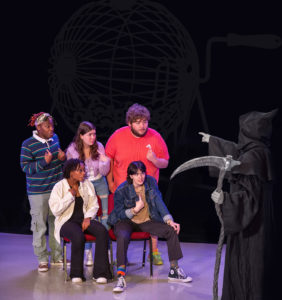
In a rehearsal moment, five actors question which of them will be chosen by Death to play the title role in a particular performance of “Everybody” by Branden Jacobs-Jenkins. From left are, seated, Waxahachie junior Kiya Green; Denton junior Connor Molen; standing, Texarkana junior Daun Whaley; San Antonio junior Hannah Marfin; Baytown junior Joshua Harris; and far right, Sugar Land freshman Anthony Krosecz as Death.
Included in this year’s Stephen F. Austin State University School of Theatre and Dance’s Mainstage Series, “Everybody” is a “multifaceted opportunity for our students and audience,” said theatre Professor Scott Shattuck, the play’s director.
“It’s part classic play, part up-to-the-minute contemporary experimental theatre,” he said. “It treats serious themes but does so in a humorous tone. It’s approachable and accessible, but it’s full of surprises. It also offers lots of opportunities for a very diverse cast in which almost anyone of any race, ethnicity, gender, size, age, etc. can play almost any role.”
“Everybody” runs Feb. 23 through 26 in Kennedy Auditorium on the SFA campus. Like its source material, the medieval morality play “Everyman,” it’s an “allegorical story in which a representative human faces the prospect of imminent death and tries to find a way to avoid or ameliorate the situation,” according to Shattuck.
“In particular, this person, which could be any of us, tries to find someone – a friend, a family member, even an inanimate object – who will accompany them into the afterlife,” he said. The play’s distinctive twist is that, at any given performance, any one of five different actors could play the title role, based on a lottery which also determines what roles will be played by the other four actors in that group.
“Almost all of the actors play multiple roles, or could be cast in different roles at different performances,” Shattuck said. “Some transform before the audience’s eyes from one kind of character to something entirely different. The play is simultaneously emotionally authentic, completely theatrical, and intellectually abstract, and often downright silly. So the acting style needs to be all things to all people.”
As a result, the directors, cast and crew are “inventing a process as we go along,” Shattuck explained. Scenes need to be rehearsed with five different possible actors in various roles. There’s a lot of sound recording technology involved, and the staging needs to use the entire theatre, including the lobby, the audience seating area, the backstage areas and, of course, the stage itself.
But, “Everybody” is not for everybody. Shattuck describes it as “full of irreverent humor with abundant and extreme profanity, so it’s not appropriate for children or anyone sensitive to such language.” It also questions traditional ideas about God and the afterlife, possibly making it offensive to some people with strong religious beliefs. “Nevertheless, we think it will interest and amuse a broad and diverse audience of open-minded adults.”
Typically based on themes like love and hate and life and death, classical plays, like most classical literature, convey themes that are timeless. Such is the case with “Everybody.”
“No matter how old those stories are, they can be told in ways that are fresh and contemporary,” Shattuck said. “And live theatre will never exhaust its potential to surprise its audiences.”
Performances are at 7:30 p.m. Thursday through Saturday, Feb. 23 through 25, and at 2 p.m. Saturday and Sunday, Feb. 25 and 26. General ticket prices are: adult, $15; senior (62+), $10; youth (high school and younger), $8; SFA faculty/staff, $8; non-SFA student, $8; and SFA student, $5. For ticketing information or to purchase tickets, call the Fine Arts Box Office at (936) 468-6407 or (888) 240-ARTS, or visit boxoffice.sfasu.edu. For information about the play, call (936) 468-4003 or visit sfasu.edu/theatre-dance.



